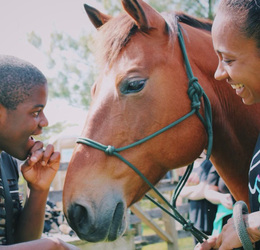
When Sarah Mognoni first learned how to ride horses at 6 years old, it was in the wide-open spaces of “really old-fashioned ranches” in Colorado and southern Arizona, and always with an emphasis on extending a great deal of respect to the living creatures she trusted with her safety year after year.
Even as a youngster, it felt like the best, most obvious way to approach not only riding but also engaging with a beautiful, majestic animal, which is why she was a little baffled at the jarring differences she encountered when she continued riding out East.
“Horses entered my life very early,” she says. “The people who taught me were Western wranglers who, in many cases, were the descendants of people who had come across the country in covered wagons. They were the real thing. It’s not the typical connection to horses that most people who live in New Jersey get to experience, but it’s really the basis for how I view working with them.”
Mognoni’s approach to horses is informed by that culture of natural horsemanship, a mutually beneficial philosophy that allows both horses and humans to meet each other where they are. That gentle, attentive method necessitates visitors leaving the outside world and its accompanying anxieties and attachments at the gate to fully and mindfully immerse themselves in engaging with a herd animal in its element—after all, her horses at Ahavah Farm are free to choose when they engage with people, when they stay with the other horses and when they seek shelter.
“You cannot be checking your text messages while you’re with a horse—that alone is therapeutic for people,” she explains. “[The farm] is very open, the horses do not live in stalls or in a barn since we have free-choice shelters. They choose when they go in and out of the shelters, they exist in a herd so they’re not separated from each other. There’s a very strong connection to the natural world, so even if you’re there for just an hour, you get a chance to see the herd in action. That, again, is very different from a traditional riding stable.”
Sometimes riding doesn’t even happen, which Mognoni is quick to point out actually yields one of the many real-life lessons her students encounter while learning how to apply the tenets of natural horsemanship to challenges and hurdles beyond the farm.
“Horses have the right to say no,” she notes. “When a horse says no to you … it becomes the basis for the lesson: Are you interested in creating a dialogue with that horse that allows the horse to say yes, or are you just going to allow the horse to say no that day? There are all kinds of ways to handle that, which, in my opinion, raises people’s critical-thinking and problem-solving skills by putting them in a situation where they really must solve problems in a way that’s successful for the horse and for them.”
Learning with natural horsemanship also amplifies the therapeutic payoff of equine bonding, a richly life-enhancing relationship that transcends species and spoken language to foster a deeper connection between horses and people of all abilities and cognitive levels. Offering equine therapy is especially beneficial to neurodivergent individuals, which is why part of Ahavah Farm’s therapy outreach includes a unique non-riding program for individuals with autism, Down syndrome, trauma, anxiety and more.
“The therapeutic nature is that it’s completely engaging,” Mognoni points out. “What I find with visitors and clients who are very high on the autism spectrum, etc., is that the environment itself … gives people the opportunity to observe how horses react to their entire world. That’s why it’s therapeutic to watch that horse react and interact: It’s not a man-made environment, it encourages people to be very observant of every level of the horses’ body language. And that’s a completely new experience for people, since they’re not used to looking at horses in that way.”
While Mognoni herself has been a student of natural horsemanship for 23 years, that education she shares with others isn’t the only opportunity for learning at Ahavah Farm. Ahavah’s Women, History and Horses project endeavors to offer an alternative view of equestrian history, celebrating the women who’ve left their mark on 5,000 years of horse-human connections.
“Millions and millions of women are in the horse industry, but it has tended, I think, historically to be fairly chauvinistic,” she begins. “My goal is to tell some of these women’s stories with horses and in period costumes and using their own quotations.”
And while educating others is at the cornerstone of what Mognoni does, she is committed to continually learning, too. Just like people, no two horses are the same, and she loves both the challenge of learning how to engage with new animals and the payoff of earning their trust.
“It’s about observing another species and paying a little less attention to yourself,” she says. “By doing this life-enhancing work, my entire life view has changed.”
Ahavah Farm
1625 Conrad Ave.
Waterford Works
Colorful Living Studio
1221 Brookfield Lane
(856) 340-3784
Facebook and Instagram:
Ahavah Farm-Colorful Living Studio
AhavahFarmColorfulLivingStudio.com
Visit the website to register for Ahavah Farm’s Oct. 21 Fall Open Day
Published (and copyrighted) in Suburban Family Magazine, Volume 14, Issue 4.
For more info on Suburban Family Magazine, click here.
For information about advertising in Suburban Family Magazine, click here.
To find out where to pick up your copy of Suburban Family Magazine, click here.




